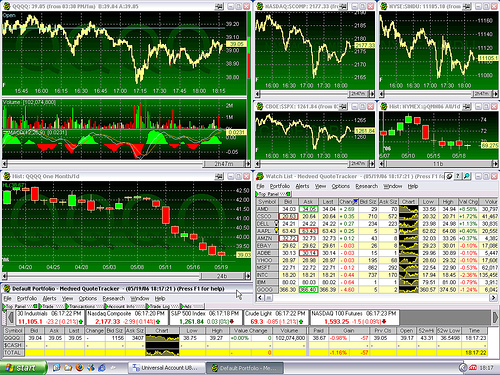With nothing on the line, emotions fall to the wayside and you will probably miss the opportunity to learn something about yourself. Trading in the market is essentially learning about yourself and how you react to positive and negative situations. A great speculator once said that the market is an expensive place to find out who you are. However, you will never find out who you are by trading a paper account or virtual portfolio.

Paper trading seems to be the most over emphasized technique offered by market theorists, educational elite, market novices and/or market frauds. While learning the pure basics, I can see why a novice investor may want to paper trade; to see the results of the developing system but I will warn that these results are completely false. The results will not contain the emotional decisions that go along with risking your own cash. Anyone and I mean anyone can paper trade successfully.
It’s simple: place a trade and hope it goes up and if it doesn’t, you have no worries because you can’t lose. Therefore, you are apt to forget about sell stops, position sizing, risk-to-reward ratios and you will never experience the pressures of an up and down market when your position shows a profit or loss. The emotional imbalance that occurs when you really start to lose money is not present. Don’t fool yourself by believing the results of your paper trading or virtual portfolio. These things may give you some confidence in your system but they don’t prove a damn thing in the real world. The real world, specifically the stock market, is run by emotional human beings. People make decisions that are irrational and base their trading decisions on fear and greed. Paper trading lacks fear and greed because there is no gain and no loss; therefore there is no consequence to deal with.
We should all know by now that emotions are tied to our decisions in the markets so we can only get accurate results through actual trading. Learn to ignore the talking heads on TV that claim they are up over 1000% trading a fake account. What really makes me laugh is the person that sets up a virtual trading scenario and then allows each participant to trade $500,000 or more in their account. If you are going to trade a fake account, at least keep it authentic so you can try to learn something within the scope of reality; potentially money management.

I setup one virtual trading competition a few years back and I only allowed each participant to start with $10,000, a reasonable amount, an amount that most people start trading with. Traders are undercapitalized with $10,000 but most people start trading with this amount. The competition was fun but it was not real for me or the others. I didn’t care what risks I took and I never had a problem pulling the trigger which does happen in real life. I did try to keep my trades in line with my real life account but it varied slightly. I witnessed other traders making 20 trades per day or 20-50 trades per week. This is not real because the commissions alone, even with a discount broker will wipe you out (we weren’t day trading in this competition). I did allow margin but I saw investors abusing the fake power of leverage in their virtual account, again, playing the game for fun instead of learning something valuable.
Professors and the like teach theories while investors actually do the trading! Why would I waste my time playing for fake money when I can learn and do for real? If you want to test a system, open an account with real money, even a minimal amount and give it a try. Make sure you use enough money to allow emotions to be attached to your decisions. Without the emotional attachment, you are cheating yourself and your potential results.
This article was originally written by me back in 2005 under a title: Trade for Real
I updated the article to my current beliefs and renamed it after some excellent advice from Copyblogger during a recent exercise: Headline Remix Madness – Part Two





I agree. The best way to learn is to start trading real money. You can read all you want about money management, risk control, emotional control, etc but it doesn’t mean a thing till your pulling the trigger with your own cash.
These are all excellent points and ones that I agree with wholeheartedly. However, there is one thing that trading games can help a new trader with. That is gaining some knowledge about market mechanics. Things such as the way orders are placed and filled, how the bid/ask process works, slippage on order fills, etc. These are all valuable things that are best learned by watching them occur in real time.
Paper trading won’t work because it doesn’t build trading habits. We are all comfortable and experienced making the thousands of small decisions that happen routinely throughout our lives. Big decisions (marriage, home buying, career) happen only a few times per lifetime. Therefore we aren’t good at them, and only make them after lengthy and careful deliberation. Most often we make the wrong choices.
The market does not wait while you hesitate analyzing what to do in a crisis with the bulk of your net worth at risk. Typically the situation only gets worse, adding emotional turmoil and indecision.
Learned reflexive trading will get you out of the bad situation early by habit. After all, now it’s just another trade, and you’ve been making hundreds of them, familiarly logging into your account and clicking through the sell menu.
There’s always plenty of time to reflect on what’s happening after your routine habits have gotten you out of danger. That is the zone you want to be trading in, which can only be reached by actually doing it.
Hi Chris,
I’m not sure I can 100% agree with you here. I know it’s an accepted idea that you can’t learn anything paper trading because you have no capital at risk, but I submit that there is something more important than capital at risk in our trades — ego.
Managing losses, real or imagined (when your trades are exposed to others) is also a huge risk.
I also created a competition much like the one you did, and 30 traders joined. They were given 10k starting capital as well, and could only trade 4 stocks a time. (We were trying to minic the brash style of Dan Zanger). Because we were trading a simulator, commissions were also factored in.
I thought it would be simple — after all no money is on the line. Well, that wasn’t the case. Because we were pitted against each other, and our trades were visible, losing trades came with the loss of ego that came from exposure.
At the end of the competition, I think something like 25 of the 30 accounts were negative. If simulated trading were so easy, I would have expected many more winners. Not so.
In the end, I think the competition helped a lot. It helped some traders see what they were doing wrong. It helped others see the genuine difficulty in trading the market. And it helped others see how much a role the need to be right plays in our trading.
When it comes to simulated trading, one of my favorite quotes is: If you can’t learn to treat fake money like real money you’ll never learn to treat real money like real money.
I’m not sure who said that — but it feels a lot like the Wax On Wax Off learning method.
Thanks for the thought provoking post.
David,
Thank you for the solid reply. I see your point to a degree and I know that some traders do make decisions based on “ego” but it’s still not “real money”. My response is this: the feeling between losing fake money and real money will answer this debate. “Real money” always changes the game. Testing strategies is fine with simulators and fake money but decisions making will always be different when real money is on the line (ego aside). It does every time.